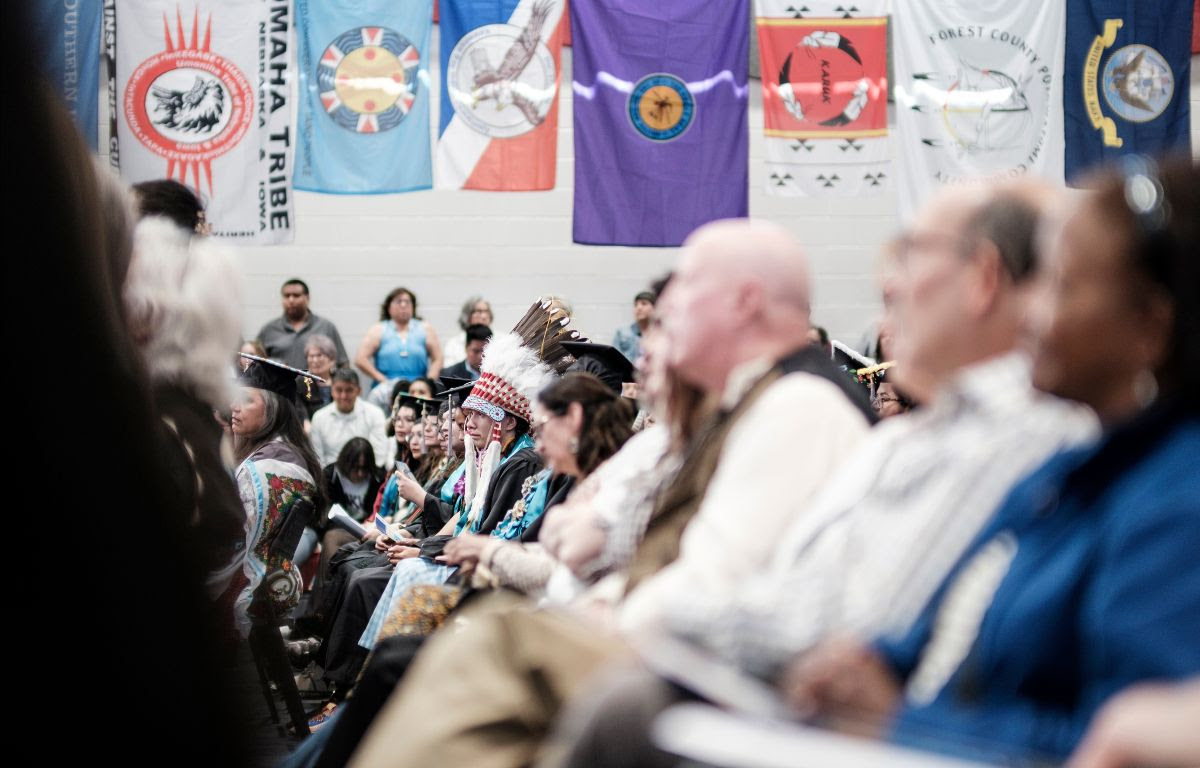
- Details
- By Levi Rickert
The Trump administration is proposing a drastic reduction in funding for tribal colleges and universities—nearly a 90% cut—that could force most, if not all, of these institutions to shut down.
These drastic proposed cuts were released by the U.S. Department of the Interior on Monday as part of President Donald Trump’s FY 2026 Budget. The budget asks Congress to drop funding from $182 million in the current year to just $22 million in 2026.
Tribal colleges were established to serve Indigenous students who have long been underserved due to the United States' history of systemic mistreatment of Native communities.
While the document specifically references only two federally operated schools—Haskell Indian Nations University and Southwestern Indian Polytechnic Institute—it outlines a steep drop in funding for all tribal higher education programs.
The Institute of American Indian Arts (IAIA) was completely removed from the proposed budget. In the current year, $13,482 million appropriation was reduced to zero dollars. If enacted, this would mark the first time in nearly 40 years that IAIA would not receive federal support under its longstanding Enabling Legislation, Public Law 99-498, Title XV.
Ahniwake Rose, president and CEO of the American Indian Higher Education Consortium, which advocates on behalf of the nation's 37 tribal colleges and universities, told Propublica the proposed reductions will be devastating to Indian Country.
“These numbers would force tribal colleges to close,” Rose told ProPublica. “They simply could not survive with this level of funding.”
In a press release IAIA said: "In one budget, Trump is proposing to erase nearly 63 years of progress in American Indian and Alaska Native higher education, artistic expression, and decades of Congressional support for IAIA, the only institution of its kind in the world. As the birthplace of contemporary Native arts, we cannot let this happen."
IAIA alumna heather ahtone, PhD (Choctaw and Chickasaw Nation) ’93, Director of Curatorial Affairs at the First Americans Museum, recently reflected on her transformative experiences at IAIA. [We honor heather ahtone and her preference to lowercase her name.]
“Critical skills, faith in my vision, and willingness to take risks were cultivated and rooted in my experiences at IAIA,” antone said. “ IAIA exists because so many people believe in the value of Native creatives. It’s a place where students are encouraged to manifest their best ideas, explore their potential, and contribute meaningfully to their communities.”
Rep. Teresa Leger Fernández, the ranking Democrat on the House Subcommittee on Indian and Insular Affairs, emphasized that Congress will ultimately decide the fate of the budget. Her New Mexico district is home to three tribal colleges, and she underscored their vital role in Native communities.
“Tribal colleges are lifelines in Indian Country,” Leger Fernández said in a statement. “They provide higher education rooted in language, culture, and community. These cuts would rob Native students of opportunity and violate our trust responsibilities.”
More Stories Like This
10 Years of Building Business Dreams for Indigenous WomenIchigo Foundation Awards American Indian College Fund Adult Education Program
Bard College Center for Indigenous Studies (CfIS) Hosts Annual Symposium With Keynote Speaker Miranda Belarde-Lewis on March 9–10
American Indian College Fund Announces Spring 2026 Faculty Fellow Cohort
Navajo Nation Signs $19 Million Diné Higher Education Grant Fund Act into Law
Help us defend tribal sovereignty.
At Native News Online, our mission is rooted in telling the stories that strengthen sovereignty and uplift Indigenous voices — not just at year’s end, but every single day.
Because of your generosity last year, we were able to keep our reporters on the ground in tribal communities, at national gatherings and in the halls of Congress — covering the issues that matter most to Indian Country: sovereignty, culture, education, health and economic opportunity.
That support sustained us through a tough year in 2025. Now, as we look to the year ahead, we need your help right now to ensure warrior journalism remains strong — reporting that defends tribal sovereignty, amplifies Native truth, and holds power accountable.
 The stakes couldn't be higher. Your support keeps Native voices heard, Native stories told and Native sovereignty defended.
The stakes couldn't be higher. Your support keeps Native voices heard, Native stories told and Native sovereignty defended.
Stand with Warrior Journalism today.
Levi Rickert (Potawatomi), Editor & Publisher


